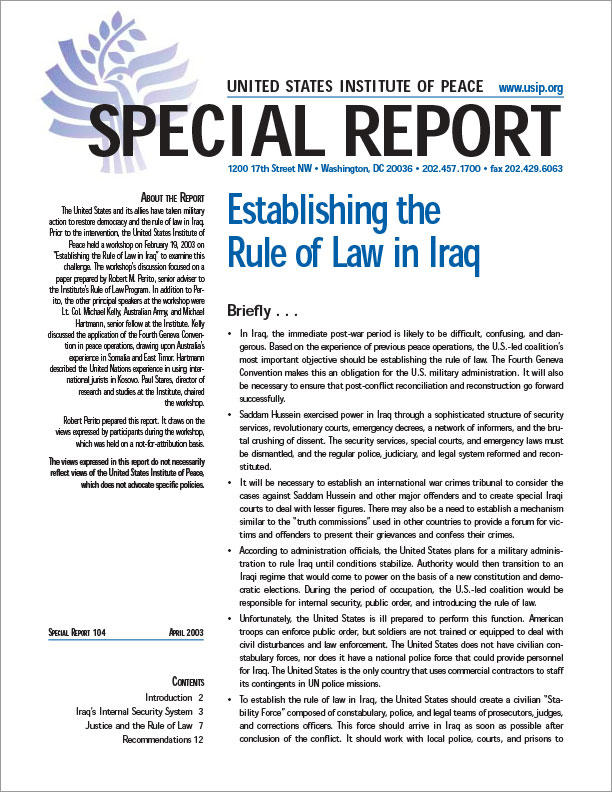Establishing the Rule of Law in Iraq

Summary
- In Iraq, the immediate post-war period is likely to be difficult, confusing, and dangerous. Based on the experience of previous peace operations, the U.S.-led coalition's most important objective should be establishing the rule of law. The Fourth Geneva Convention makes this an obligation for the U.S. military administration. It will also be necessary to ensure that post-conflict reconciliation and reconstruction go forward successfully.
- Saddam Hussein exercised power in Iraq through a sophisticated structure of security services, revolutionary courts, emergency decrees, a network of informers, and the brutal crushing of dissent. The security services, special courts, and emergency laws must be dismantled, and the regular police, judiciary, and legal system reformed and reconstituted.
- It will be necessary to establish an international war crimes tribunal to consider the cases against Saddam Hussein and other major offenders and to create special Iraqi courts to deal with lesser figures. There may also be a need to establish a mechanism similar to the "truth commissions" used in other countries to provide a forum for victims and offenders to present their grievances and confess their crimes.
- According to administration officials, the United States plans for a military administration to rule Iraq until conditions stabilize. Authority would then transition to an Iraqi regime that would come to power on the basis of a new constitution and democratic elections. During the period of occupation, the U.S.-led coalition would be responsible for internal security, public order, and introducing the rule of law.
- Unfortunately, the United States is ill prepared to perform this function. American troops can enforce public order, but soldiers are not trained or equipped to deal with civil disturbances and law enforcement. The United States does not have civilian constabulary forces, nor does it have a national police force that could provide personnel for Iraq. The United States is the only country that uses commercial contractors to staff its contingents in UN police missions.
- To establish the rule of law in Iraq, the United States should create a civilian "Stability Force" composed of constabulary, police, and legal teams of prosecutors, judges, and corrections officers. This force should arrive in Iraq as soon as possible after conclusion of the conflict. It should work with local police, courts, and prisons to maintain public order, control crime, prosecute war criminals, protect minorities, and ensure respect for human rights.
- The United States must be prepared to bear the burden of establishing the rule of law in Iraq. This will not be easy, but the contribution of a U.S. Stability Force to creating sustainable security will be more than worth the effort.
About the Report
The United States and its allies have taken military action to restore democracy and the rule of law in Iraq. Prior to the intervention, the United States Institute of Peace held a workshop on February 19, 2003 on "Establishing the Rule of Law in Iraq" to examine this challenge. The workshop's discussion focused on a paper prepared by Robert M. Perito, senior adviser to the Institute's Rule of Law Program. In addition to Perito, the other principal speakers at the workshop were Lt. Col. Michael Kelly, Australian Army, and Michael Hartmann, senior fellow at the Institute. Kelly discussed the application of the Fourth Geneva Convention in peace operations, drawing upon Australia's experience in Somalia and East Timor. Hartmann described the United Nations experience in using international jurists in Kosovo. Paul Stares, director of research and studies at the Institute, chaired the workshop.
Robert Perito prepared this report. It draws on the views expressed by participants during the workshop, which was held on a not-for-attribution basis.
The views expressed in this report do not necessarily reflect views of the United States Institute of Peace, which does not advocate specific policies.



